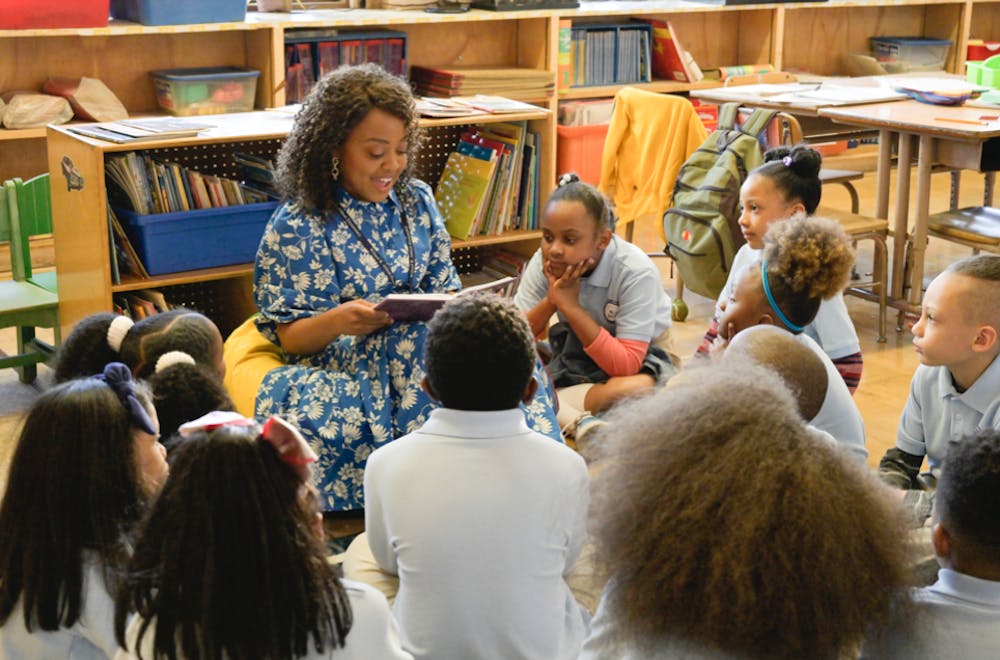Being a teacher in America is difficult –– from having to set aside time to create detailed lesson plans, staying up late to grade piles of assignments, to receiving a low salary –– this job is definitely not for the weak. These problems are even more of a challenge for those who work in low-income or inner-city schools as they are usually poorly underfunded; these teachers are forced to adopt the role of a therapist, caretaker, and janitor. Working at schools that manage limited sources also brings a financial load; staff members oftentimes must take money out of their already low salaries to finance classroom supplies that the school cannot afford.
ABC’s new sitcom show Abbott Elementary, written and directed by comedian Quinta Brunson, sheds light on the plethora of issues teachers face, as it follows the lives of a group of teachers at an underfunded public elementary school in Philadelphia trying to make the best school experience for their Black and Brown students. Each episode presents a new challenge; in one episode, one of the main characters, Janine Teagues, makes the mistake of shutting down the school’s air conditioning unit system after attempting to fix the flickering light bulb. Another episode deals with the teachers making creative videos in order to help raise money for new classroom materials. Despite the odds stacked against these teachers and a crazy principal who seems disinterested in aiding them, what brings them all together is their passion for teaching and wanting to see their students succeed. Abbott Elementary does a great job at incorporating humor and comedy in a public school setting to highlight the systemic inequality present in the education system. With the record-breaking views the mockumentary show has been receiving since its debut, the show seems like it’s definitely here to stay.
While Abbott Elementary has been receiving lots of attention, especially from teachers who can relate to the experiences illustrated in the show, some users have expressed their negative opinions about the show. TikTok user “Mindful Teacher Rachel” took to her platform to call out “unrealistic” aspects of the show, such as when kindergarten teacher Barbara used her school lunch break to get her nails done at the salon, and criticized substitute teacher Greggory for his inability to talk to one of his student’s parents regarding their class tardiness. Since the video’s upload, Rachel has faced lots of backlash from fans of the show, and many people feel as though she is being too critical of a show that is meant to be fiction. While it is important to include aspects of reality when shedding light on subjects such as the flaws within the American education system, incorporating falseness that translates to humor gives shows like Abbott Elementary the “wow” factor needed to attract audiences and effectively spread awareness on important issues.
Since the show’s debut, Abbott Elementary has been dubbed the “successor” of the popular mockumentary show “The Office.” However, the main difference between the two shows is that Abbott has a more diverse, predominantly Black cast. What many people, such as myself, have noticed, is that the amount of criticism Abbott has been receiving could be due to the shows diversity, and the fact that white teachers, such as Rachel, cannot relate to the experiences of being a Black teacher in a public school. As an example, one Twitter user responded to Rachel’s claims that teachers don’t have enough time to “chat it up in the hallways” by explaining that at her high school, the Black teachers always made use of the time in between class periods to catch up on any gossip. Additionally, another user pointed out that shows with all-white casts such as the Office haven’t received much criticism even though some of the show’s scenes are also “unrealistic” for a corporate office setting.
The moral of this story is that, like most other shows on television, Abbott Elementary is fiction and mainly created for comedic purposes. When it comes to shows that cater to majority Black audiences, white viewers often feel entitled to vocally express their opinions, which are oftentimes rooted in anti-blackness and racism. White audiences are so used to seeing themselves represented in the TV and film industry, that when Black stories are finally told, it bothers them and they lash out. Rachel’s minuscule critiques of the show are essentially baseless, especially when taking a look at the larger message Abbott Elementary conveys regarding the importance of Black students being taught by Black teachers. According to The National Bureau of Economic Research, Black students who had at least one Black teacher between kindergarten through 9th grade were “13% more likely to graduate from high school” and “19% more likely to enroll in college.” Other researchers have explained this phenomenon as the “role model effect;” when Black students see a teacher who looks just like them teaching the class, they are heavily inspired to do well in school and pursue their goals and aspirations. These benefits can be seen in the success story of Quinta Brunson, who named Abbott Elementary after her 6th-grade teacher Ms. Abbott. According to Brunson, Ms. Abbott helped “eased her transition into middle school” after no longer being in the same school building with her mother, who was also a school teacher, and “always made her feel good;” this heartfelt story only further demonstrates the crucial role Black teachers play in the success of Black students.
With the startling statistics of Black American teachers only making up 7% of the entire teacher population in America, shows like Abbott Elementary can encourage aspiring Black teachers to continue chasing after an education degree in the hopes of making a profound impact on a Black student’s academic career.



